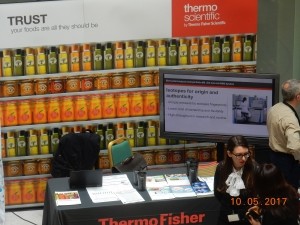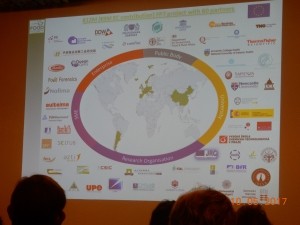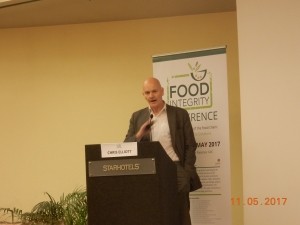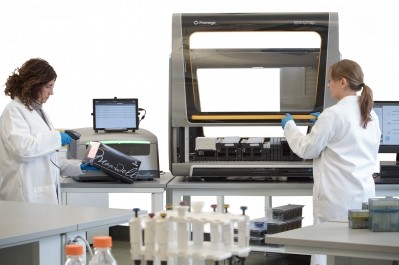dispatches from Food Integrity in Parma
Food Integrity: Organised crime and Italian authenticity
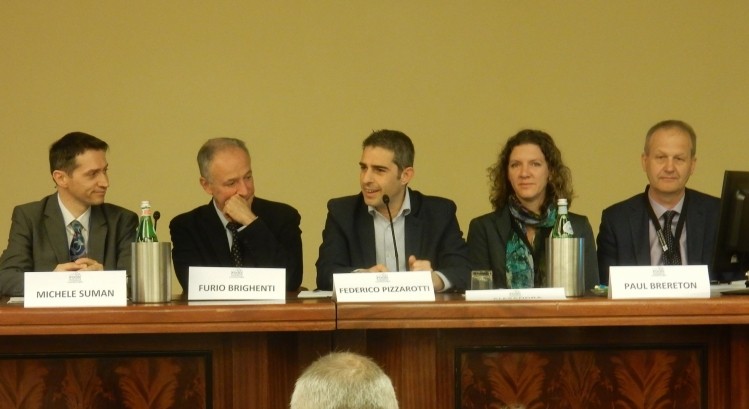
Thermo Fisher Scientific joined the European research project as a partner of INTELLItrace Work Package (WP) 18 which will focus on improving detection of adulterated products such as honey, wine, meat, fish, olive oil and coffee.
Partners are the University of Piemonte Orientale (UPO), Mérieux Nutrisciences, ICETA, The Istituto delle Scienze delle Preparazioni Alimentari (ISPA) and the University of Stuttgart.
Expected outcomes include guidelines to validate non-targeted approaches for authenticity and traceability.
The five year (2014–18) €12m project has 60 participants from 18 European countries and one from China.
Emiliano De Dominicis, R&D manager at Mérieux Nutrisciences and member of WP 18, said: “Only by working together to enhance our analytical approaches and data sharing platforms can we tackle food fraud, improve consumer safety and secure brand integrity.”
Thermo Fisher will provide the data needed for food tracking and authenticity using the Q Exactive Hybrid Quadrupole-Orbitrap Mass Spectrometer, an LC-MS/MS system that combines quadruple precursor ion selection with high-resolution, accurate-mass (HRAM) Orbitrap detection.
The data will enable other partners to apply analytical and statistical expertise to the identification of known and unknown adulterants in food.
This will contribute to development of early warning capabilities, as well as established methods to ensure the integrity of the global food chain and meet evolving regulatory demands.
Dr Khalil Divan, senior director, global food and beverage market at Thermo Fisher, said: “It is through participation in collaborative projects like the European Food Integrity Project that we have the opportunity to address industry challengesand further develop our analytical tools and methods used to ensure consumers have access to safe food and beverages.”
Questionnaires and Food Fraud Network findings
Francis Butler of University College Dublin told attendees it recently sent a questionnaire via food fraud network members to 85 people with questions in relation to detection of fraud and role of analytical equipment.
Results so far show 68% had to deal with a fraud incident they actively detected in the last two years and 85% detected fraud through analytical means.
Butler stressed the results were provisional with 22 respondents from a variety of sectors.
Eric Marin from DG Sante said there were more than 300 cases through the Food Fraud Network (FFN) in 2016 (more detail in our coverage of the annual report soon).
This involved 87 cases in the Administrative Assistance and Cooperation (AAC) Network which deals with non-compliances and 172 in the AAC-FF for cases which have a suspicion of food fraud.
Preliminary results for January to April this year are 93 AAC AA and 35 AAC FF cases.
Marin said addition of water was a particularly challenging area due to a lack of standardised methods.
Low risk and role of e-commerce
Sergio Tirrò from the Carabinieri NAS (Nuclei Antisofisticazioni e Sanità) said organised crime groups are interested in the food sector due to the low risk.
He said hundreds of people need to be involved as fraudsters need a supply chain to package and ship food overseas.
Tirrò said cooperation between the public and private sector essential especially for identifying if a product is counterfeit or the original.
Issues include counterfeiting, Italian-sounding names outside of the country and expired food being used instead of paying for it to be destroyed.
Stefano Vaccari from ICQRF said social networks are playing a strong and more penetrating role in e-commerce.
ICQRF is the law enforcement body of the MiPAAF (Italian Ministry of Agriculture, Foodstuff and Forestry Policies) to stop fraud and safeguard quality of agrifood products.
The agency has a MoU with eBay, cooperation with Amazon and MoU with Alibaba.
Vaccari said out of 1,797 operations outside Italy and on the internet it has a success rate of 91% when it takes action, meaning eBay, Alibaba and Amazon stop selling product within hours or days.
Food fraud and food safety
Professor Chris Elliott said a recent follow-up to oregano testing in 2015 found only one sample out of 40 adulterated.
A survey in the US in the first half of 2016 found an adulteration level of 25% in 28 samples.
He said worldwide adulteration ranges between 0-60% with a global average of about 25% and there is no difference between developing and developed world.
Professor Elliott said fraud can become a safety issue as adulterated oregano had higher levels of pesticides than genuine product with fraudsters not thinking about food safety.
Barbara Gallani, head of EFSA’s Communications and External Relations Department, said its role in food fraud and authenticity is limited with the remit focus on food safety.
However, it does urgent risk assessments to support crisis and incident management and was involved in horse meat to work on presence of a drug called Phenylbutazone (bute) which is not authorised for animals in the food chain.
Another area is fish substitution as mislabelling of fish species and origin has potential food safety implications such as heavy metals, hygiene conditions and residues of veterinary medicines.
Gallani also covered emerging risks and emergence of consumption of green smoothies considered as a health food.
Due to oxalic acid in the drink high consumption could cause additional kidney stones and overconsumption can reduce availability of calcium, iron and potassium.
Beatriz Torres of International Featured Standards (IFS) said version 7 should be ready by the end of this year.
She said the supply chain is vulnerable due to short or medium term rather than long term supplier relationships, long fragmentary chains, lack of information and intelligence sharing, multiple sources of ingredients and easily counterfeited labels and packaging.
Torres said two recent cases related to geographical origin involving blackberries from Sweden actually from Croatia and garlic.
Luciano Navarini of illycafé said coffee is susceptible to fraud due to particle size, texture and colour which can be reproduced by roasting and grinding a variety of biological materials.
He said chemistry may assist in looking for specific molecular markers with 16-OMC (16-O-Methylcafestol) exclusively present in Robusta but Kahweol is not a specific marker of Arabica.
Navarini said rapid methods can monitor different classes of chemical compounds simultaneously with limited sample prep and no purification.
He added DNA-based techniques are not yet reliable for roast and grounded coffee.
This area was also the subject of a recent review by researchers.
